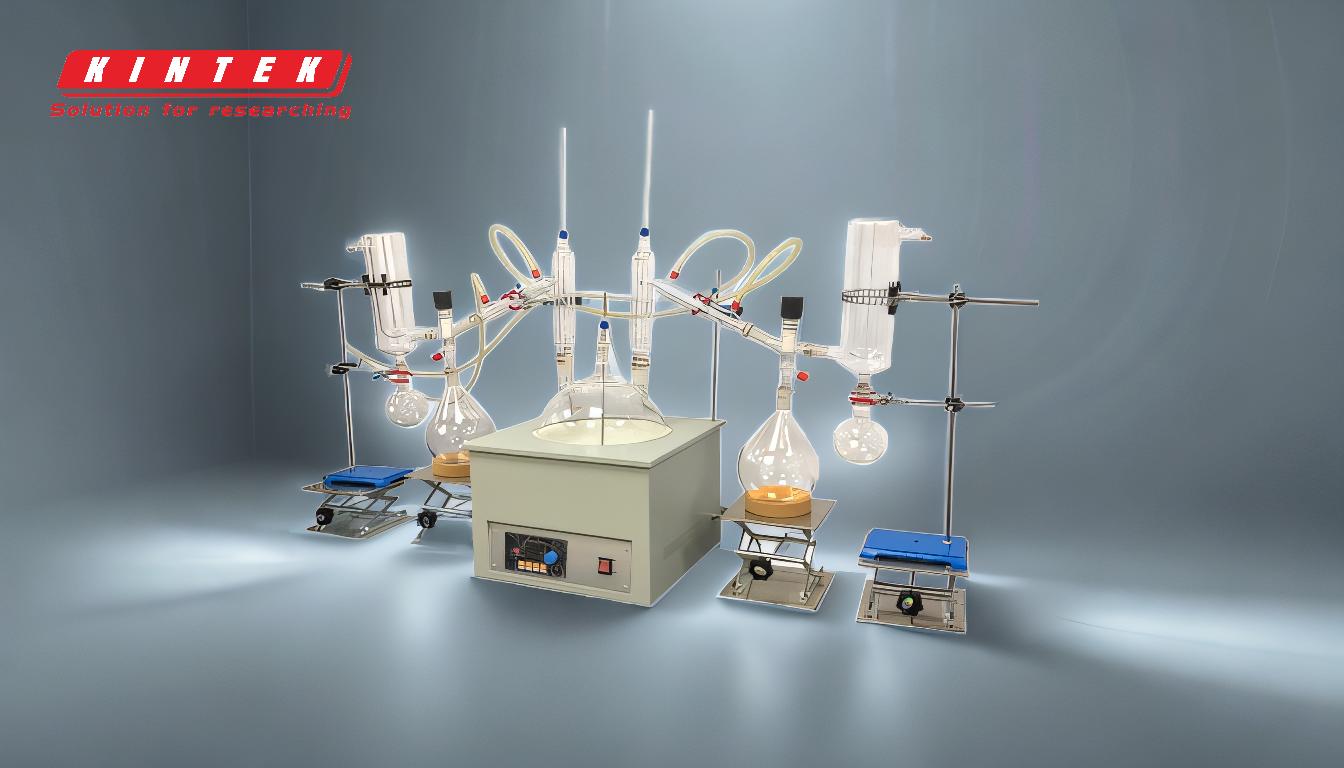Vacuum distillation is a specialized technique used primarily in industries such as chemical, pharmaceutical, and desalination for separating and purifying liquids with high boiling points or those that are heat-sensitive. By reducing the pressure within the distillation apparatus, the boiling points of the components are lowered, allowing them to vaporize at lower temperatures. This prevents thermal degradation and enables the collection of high-purity distillates. The method is particularly advantageous for processing compounds that would otherwise decompose at their normal boiling points. Additionally, vacuum distillation offers benefits such as reduced energy consumption, increased yield, and improved product quality, making it a critical tool in industrial applications.
Key Points Explained:

-
Principle of Vacuum Distillation:
- Vacuum distillation operates by lowering the pressure inside the distillation apparatus, which reduces the boiling points of the components in the mixture. This allows heat-sensitive or high-boiling-point liquids to vaporize at lower temperatures, preventing decomposition or degradation.
- When the vapor pressure of a component equals the surrounding reduced pressure, it vaporizes, condenses, and is collected as a high-purity distillate.
-
Applications in Chemical and Pharmaceutical Industries:
- Vacuum distillation is widely used for separating and purifying liquids with high boiling points or those that are sensitive to heat. Examples include the purification of essential oils, pharmaceutical intermediates, and specialty chemicals.
- It is particularly valuable for obtaining high-purity samples of compounds that would decompose at their normal boiling points.
-
Desalination of Seawater:
- Vacuum distillation is employed in large-scale desalination plants to remove salt from seawater, producing fresh water. The reduced pressure lowers the boiling point of water, making the process more energy-efficient compared to traditional distillation methods.
-
Advantages of Vacuum Distillation:
- Prevention of Thermal Degradation: By operating at lower temperatures, vacuum distillation minimizes the risk of decomposition or polymerization of heat-sensitive compounds.
- Energy Efficiency: Lower boiling points reduce the energy required for vaporization, making the process more cost-effective.
- Increased Purity and Yield: The method allows for the separation of close-boiling mixtures with fewer equilibrium stages, resulting in higher purity and yield.
- Reduced Capital Costs: Vacuum distillation columns can be smaller in height and diameter compared to atmospheric distillation columns, lowering capital investment.
-
Combination with Other Techniques:
- Vacuum distillation is often combined with other separation methods, such as steam distillation or fractional distillation, to enhance the efficiency of separating complex mixtures, particularly aromatic compounds.
-
Industrial-Scale Benefits:
- Reduced Residence Time: Lower pressure and temperature reduce the mean residence time of the product in the distillation column, minimizing degradation.
- Scalability: The technique is scalable and suitable for large-scale industrial applications, offering consistent performance and high throughput.
-
Limitations and Considerations:
- While vacuum distillation offers numerous advantages, it requires specialized equipment to maintain the vacuum, which can lead to slightly higher operating costs.
- The process must be carefully controlled to avoid leaks or pressure fluctuations, which could compromise the quality of the distillate.
In summary, vacuum distillation is a versatile and efficient method for separating and purifying high-boiling-point or heat-sensitive liquids. Its applications span across industries, from chemical and pharmaceutical manufacturing to desalination, offering significant advantages in terms of product quality, energy efficiency, and process scalability.
Summary Table:
| Aspect | Details |
|---|---|
| Principle | Lowers pressure to reduce boiling points, enabling vaporization at lower temps. |
| Applications | Chemical, pharmaceutical, and desalination industries. |
| Advantages | Prevents thermal degradation, reduces energy use, increases yield & purity. |
| Industrial Benefits | Scalable, reduced residence time, consistent performance. |
| Limitations | Requires specialized equipment, higher operating costs. |
Learn how vacuum distillation can optimize your processes—contact our experts today!










